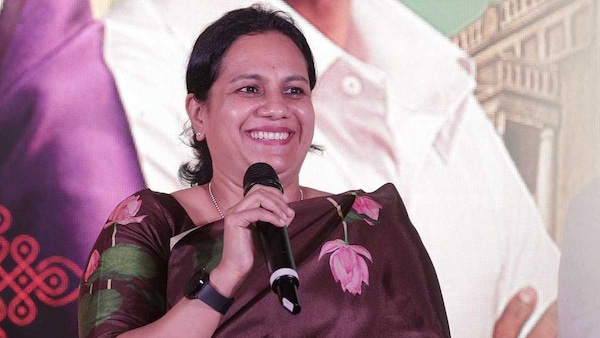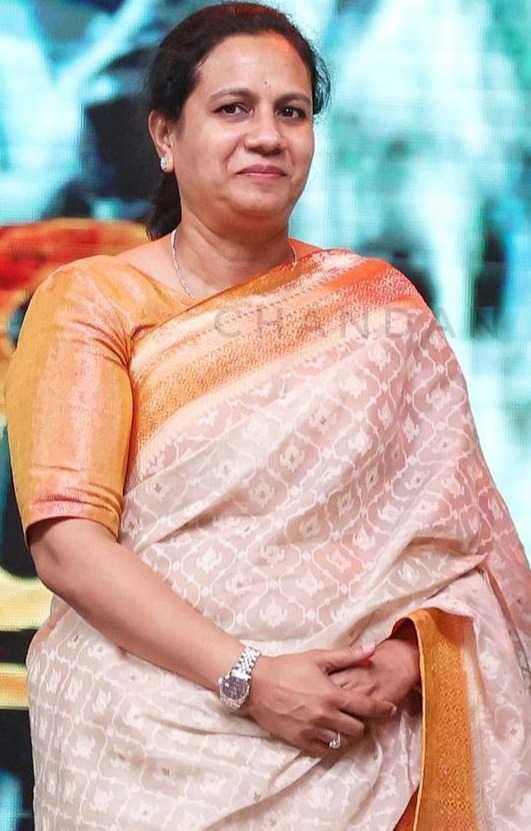Exclusive! Ashwini Puneeth Rajkumar: PRK Productions will continue to make clean entertainers in different genres
Film adaptations of novels will be on the cards for PRK Productions, says Ashwini

Last Updated: 12.50 PM, Jul 29, 2023
Ashwini Puneeth Rajkumar has been the backbone of her production house, PRK Productions, from the time it was established in 2017, but until Puneeth’s tragic demise in 2021, she was content staying behind the scenes. In an exclusive conversation with OTTplay ahead of the release of her next production, Aachar & Co, Ashwini takes us through her journey as producer, the influence her mother-in-law had on her as a filmmaker, her choice of scripts, the challenges of working with newcomers, among others.
When PRK Productions was launched, although it was meant to be run by you, Ashwini, until his untimely demise, Puneeth continued to be the face of the banner. You were happy remaining behind the scenes and rarely ever spoke about his films or the ones you were producing. How have you evolved over the years?
When Appu was in films, I was the silent spectator, but from the time we started PRK Productions I was involved from day 1, be it the script, finances, production, etc. But I was never interested to be in front of the camera. I was happy handling my responsibilities offscreen, it was not necessary for me to voice my opinions. Having said that, I was my husband’s biggest critic, which he took with a pinch of salt, but the decisions with regard to PRK Productions were always made together. It was always about figuring out what each of us thought about a certain project and it would go on floors only after both of us were in agreement on the script.
How was the work division at PRK Productions and PRK Audio?
I would handle everything related to the productions, since he would be busy with his film shoots. As I said, script selection was a joint decision, after which he would let me take over. He’d say, ‘My job is done, now it is your responsibility’. He insisted that I learn everything about filmmaking from scratch. Since Appu was very meticulous about anything he did, he’d want me to give him a complete run-down of what happened every day. So, I’d inspect sets and be aware of everything that was happening. Music was one of the only aspects that I was not very comfortable with – I could not judge great music, to be honest. That used to be his forte.
But then with our latest production Aachar & Co, when Bindhumalini came onboard as composer, I loved her music the minute I heard. It sounded very different.

How much of an influence was your late mother-law, Parvathamma Rajkumar, or your brother-in-law Raghavendra Rajkumar, in your growth as a producer?
When I got married, my mother-in-law was still producing movies. I had, however, heard stories of how she was as a producer, and a tough one at that. In fact, there was a respectful fear that everyone had about her. As the youngest daughter-in-law, I only saw the strong side of her and how much of an influence she was at the work place.
One of her major influences on me was that every time she saw me reading a novel, she’d tell me that if I thought it was good enough to be turned into a film, I should pursue that. She was a voracious reader herself and had done a lot of film adaptations of novels as a producer. She thought I should run these novels by a few directors if it would fit in. Back then, reading was only a passion, but now I have slowly started thinking that maybe I should look into adaptations of novels seriously.
How would you describe your idea of picking stories?
I want to pick simple stories that are not too complicated. It should be content-driven and the presentation should be good. I am looking for some nice simple tales that will strike a chord with audiences. Cinema, for me, has to be about entertainment. I know that my father-in-law’s (Dr Rajkumar) films were message driven, as also a few of Appu’s movies. I like clean entertainers in different genres.
Sometimes, the content is good, but it is not presented as was discussed initially. That’s a challenge I face with newcomers, not with all, but I have had such experiences with a couple of our movies. But then again, you don’t know till it is done.
But how is a film like Aachar & Co relevant for today’s audience? It’s a film set in the Bengaluru of the 60s…
There is no guarantee for the success of a movie; there is no set formula. When Appu and I listened to the script, it took us back to my childhood days with my grandparents and old Anant Nag sir movies that we watched as children. So, we thought why not present something like that in a new avatar. The hope is that for the younger generation it will be something different. See, Aachar & Co is a very simple film that you can watch with your family. I loved the screenplay and wanted to present it to younger audiences. It’s a coming-of-age tale for women, where the protagonist is pushed to go and work. I come from a family where my grandmother’s generation of eight siblings, seven of who were girls, were all highly educated in the 50s. That was also why the script of Aachar & Co struck a chord with me.

